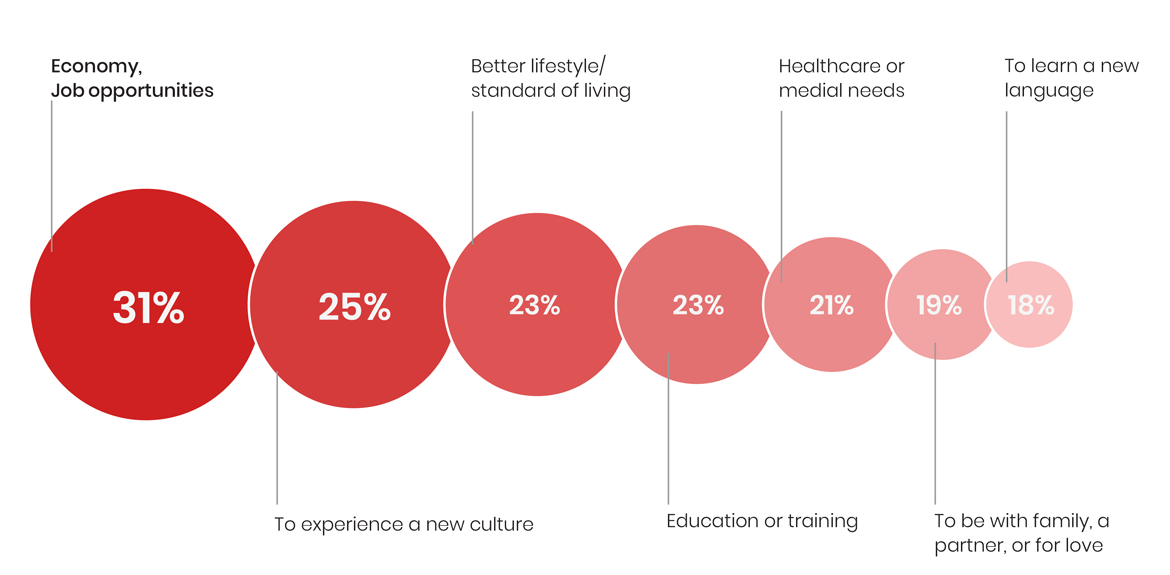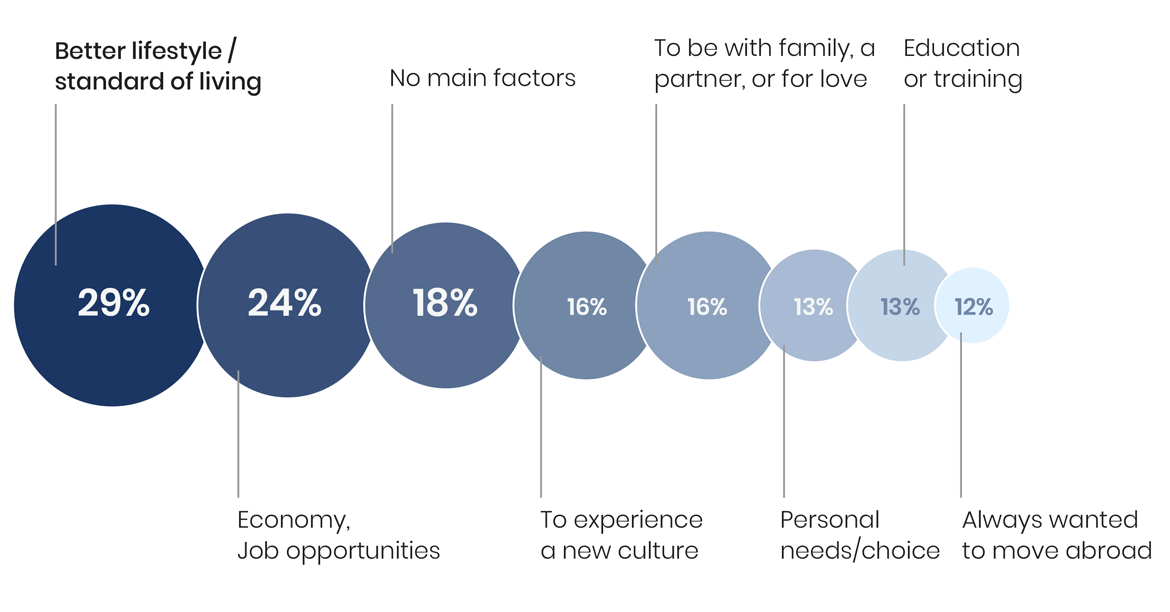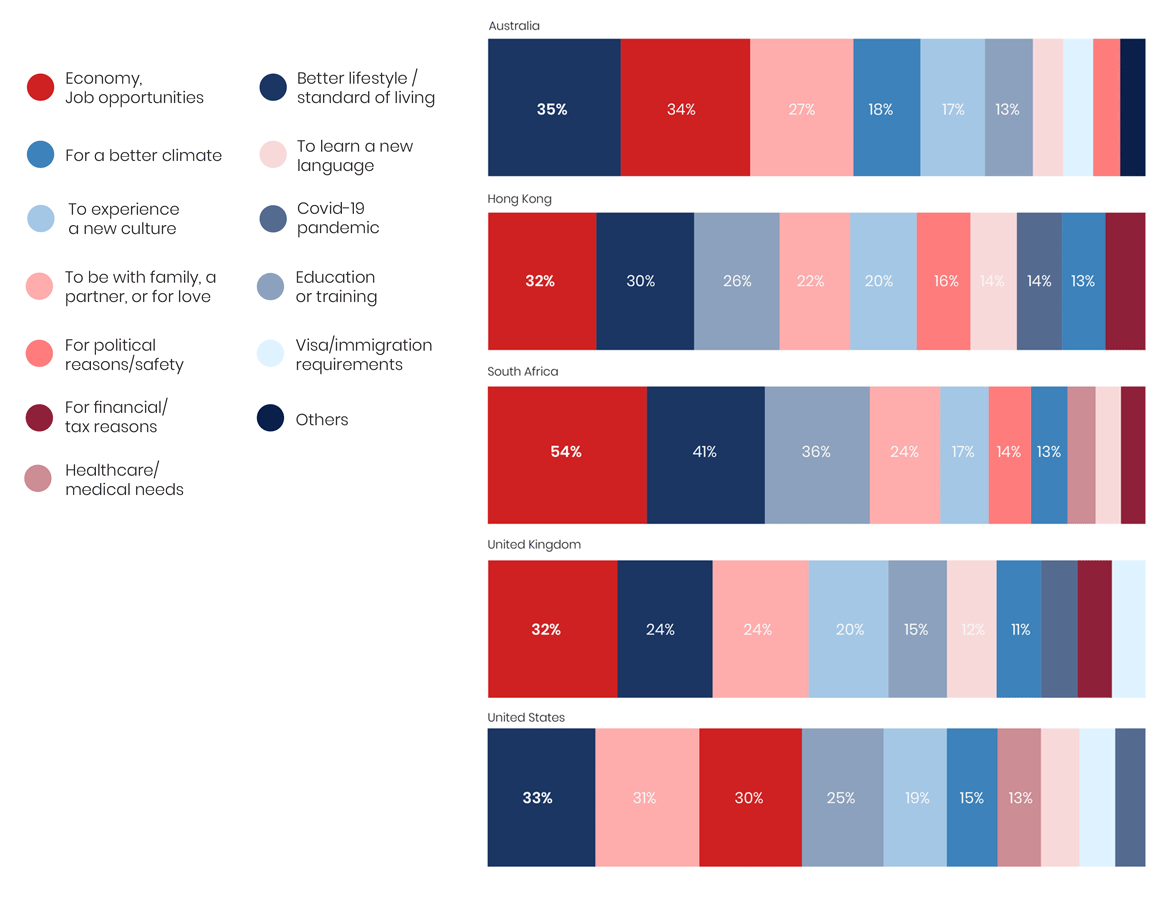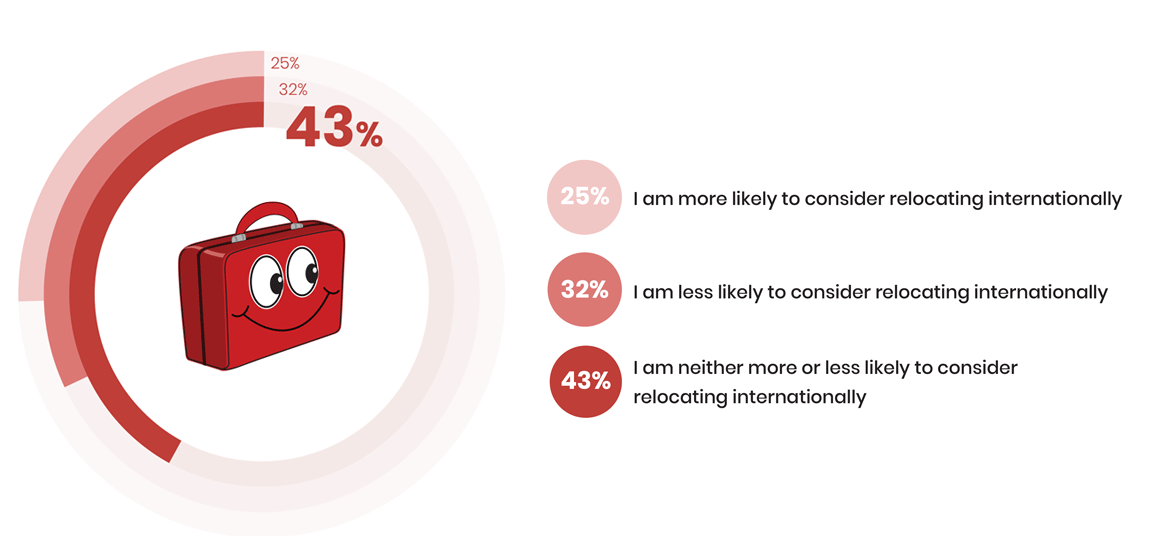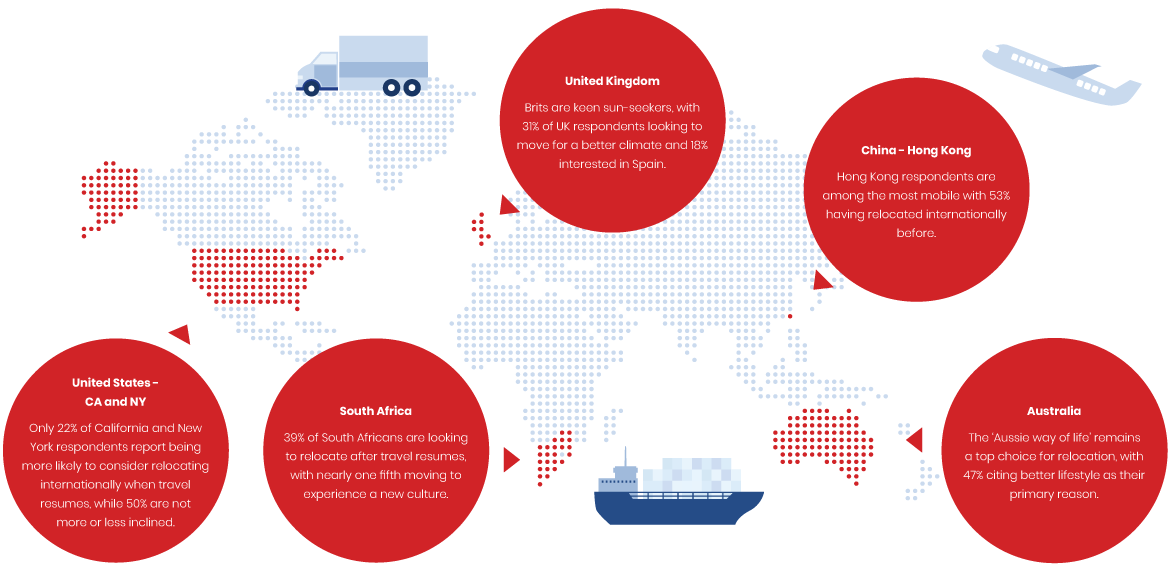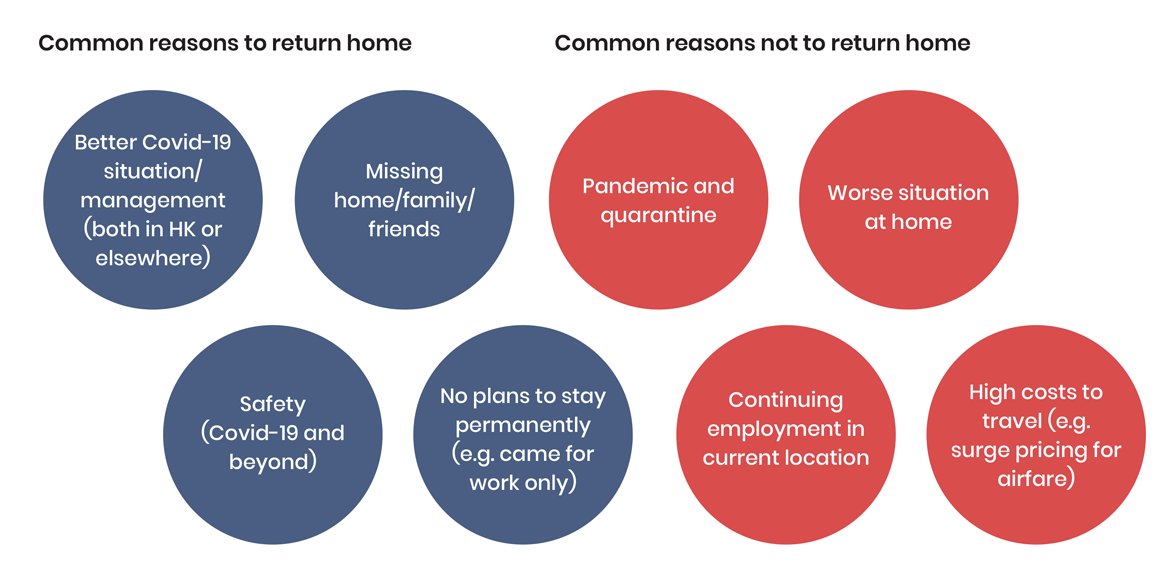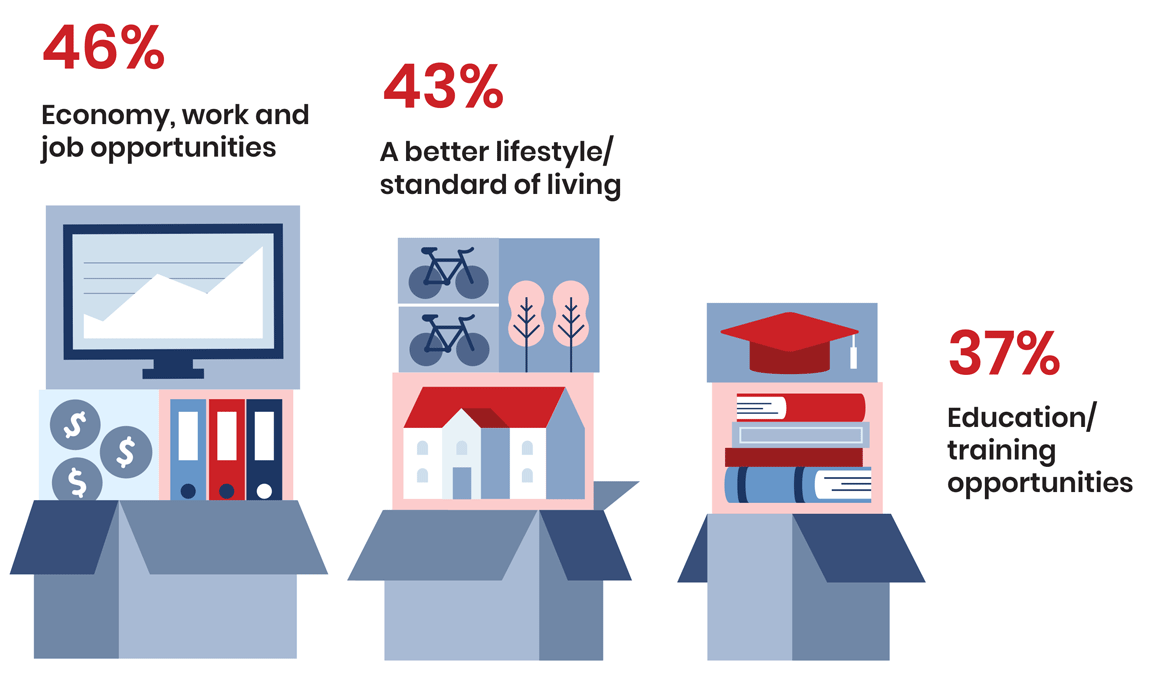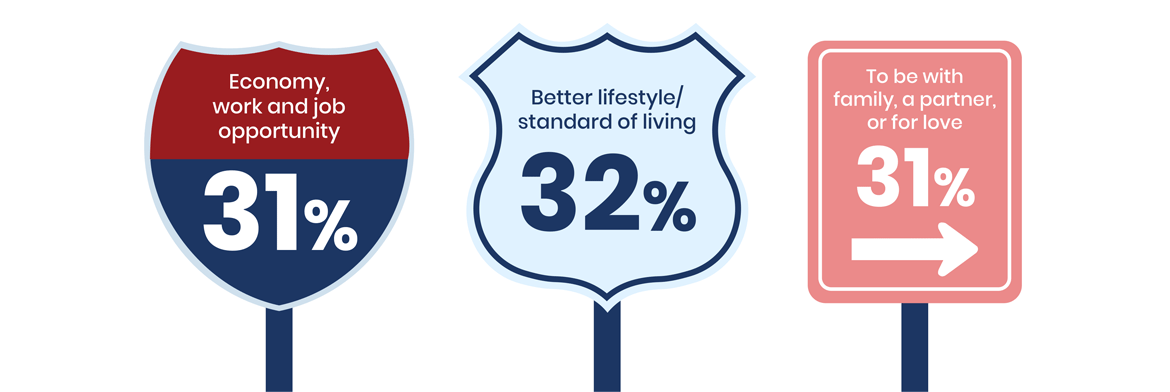Before packing, check this list of items prohibited from entering a particular country or region.
Welcome
The events of the past 18 months have been tumultuous to say the least – with fluctuating freight rates, a container ship stuck in the Suez Canal, and one of the worst pandemics in living memory, just to name a few. But as the old saying goes, calm seas don’t make for good sailors. While the future grants us the benefit of hindsight, our task for today is to gather more information.
In addition to our own data based on day-to-day interactions with customers, we decided to engage a broader sample of people from around the world in the form of a comprehensive survey on global movement.
In this survey, we asked people where they were moving and why, and how the pandemic has affected their plans.
We also investigated the underlying factors people consider when moving abroad – many of which may have been re-prioritised or adjusted since the pandemic began. It became clear that Covid-19 has not only affected people on a practical level, but on an emotional level as well; causing many to revisit their motivations for moving abroad.
Our research further revealed that while people often do have specific reasons for deciding whether or not to move, they primarily do so as a means of creating their own opportunities, rather than in response to circumstances. Whatever your industry, we hope you find this report helpful and informative – and that together, we can apply these insights towards a future in which we all can move around with agility, safety and reassurance.

John and Will Henderson
Managing Directors and Co-Founders of Seven Seas Worldwide
What's in this report?
Part 3 - Key takeaways
Introduction
For the past 25 years, Seven Seas Worldwide, a family-owned business, has been a reliable partner for people taking up new and exciting opportunities as part of their life journeys, offering stress-free relocation with specialised solutions to all of our customers. Throughout this time, we have had the chance as part of our normal business operations to look at the reasons behind relocations, and to see who is moving where.
Building on this, we have launched the Global Movement Report; a global survey which has revealed some impactful insights, which we are proud to share with you here.
Life decisions such as relocation are important and require much research and consideration. In today’s world, particularly after the upheaval experienced as a result of Covid-19, global mobility is increasingly relevant as an indicator of economic health.
Against this backdrop, we probed the rationale behind relocation decisions, to get a clearer picture of the direction in which the world is heading, and the future of relocation.
Between 4 June and 16 June, 2021, we surveyed 5,026 consumers with passports in key markets, of whom at least 25% of our sample of respondents were considering or would like to move abroad, while at least 10% considered themselves expatriates.
The global view
Of all survey respondents, 2 in 5 people surveyed said they have relocated internationally before, while more than 1 in 6 (16.9%) said they have relocated internationally more than once. Those in Hong Kong were the most likely to state that they have relocated internationally before (52.6%), followed by Australia (45.5%), the US (38.2%), South Africa (33.0%) and the UK (29.1%).
Globally, just over one fifth (22.3%) said their most recent relocation was to move from a country that was not their home country to another, while most markets are evenly split between people moving from or returning to their home countries - with a couple of notable exceptions. In Australia, 44.8% of relocating respondents report moving away from their home country, compared to 35.0% who are returning.
In Hong Kong, the reverse is true - where over 2 in 5 (41.4%) of relocating respondents are returning, versus 34.9% who have moved here from somewhere else; a surprising fact given recent news of many expatriates expressing their intention to leave the city.
Fig 1 - Types of international relocations made
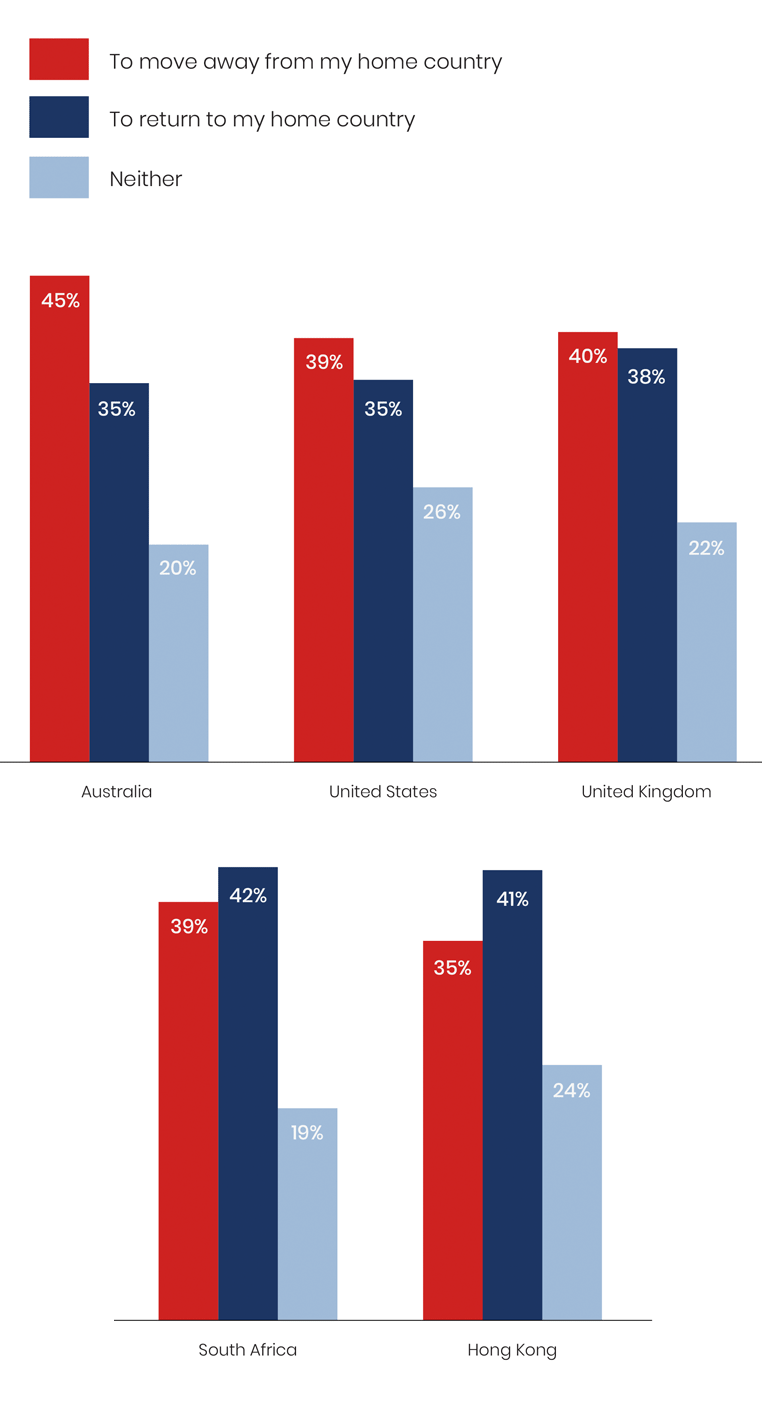
Q: Thinking about your most recent relocation, was this to return to your home country, to move away from your home country, or to move from a country that wasn’t your home country to another non-home country?
Our survey also looked into the considerations and motivations for people relocating internationally, polling the top reasons why they chose the particular destination for their move. We divided our analysis into external reasons, such as career and visa opportunities, while also comparing these against more personal reasons such as for better lifestyle, a better climate, for family or for love.
For all respondents who have relocated internationally in the past, the top reasons were given as: economy, work and job opportunities (36.1%), better lifestyle or standard of living (32.4%), to be with family, a partner, or for love (25.6%), education or training (22.7%), to experience a new culture (18.6%), for a better climate (14.3%), and to learn a new language (11.1%).
While the reasons for moving remain largely the same, with job opportunities and work holding the top spot, there were some shifts in primary motivators when compared with previous moves:
- As expected, Covid-19 was a top consideration in people’s most recent moves - while being with family moved from fifth-most to third-most important in comparing past to recent moves.
- Career opportunities remain the primary concern or key “ingredient” for an international relocation, while emotional or personal considerations follow more closely behind in the past year.
Fig 2 - Reasons for relocation that occured between Dec 2019 - Jun 2021
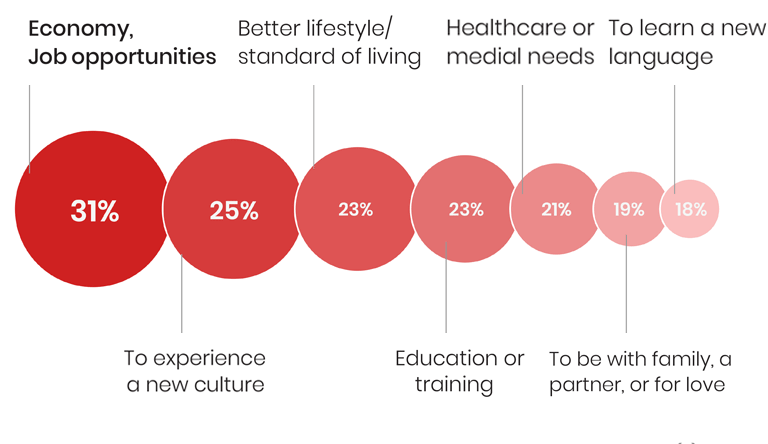
Q: Thinking about your previous moves, what was your reason(s) for relocating internationally? [Multiple responses allowed]
When asked to contemplate a future move, the results are slightly different. Among all respondents, the main factors for considering a move abroad were better lifestyle (29.3%), economic or job reasons (24.3%), no main factors (17.9%), to experience a new culture (15.8%), family, a partner or love (15.6%), personal needs or choice (13.2%), education or training (13.1%), or always wanted to move abroad (12.3%).
These results may well indicate that many people don’t necessarily need one specific reason or opportunity to move – rather, they are simply creating their own opportunities. This could also denote a strong underlying restlessness, curiosity or displeasure with one’s current location when it comes to initial thought processes around moving, given the high ranking of “better lifestyle” and “new culture”, reflecting the classic saying that “the grass is greener on the other side”.
Fig 3 - Reasons for a prospective move
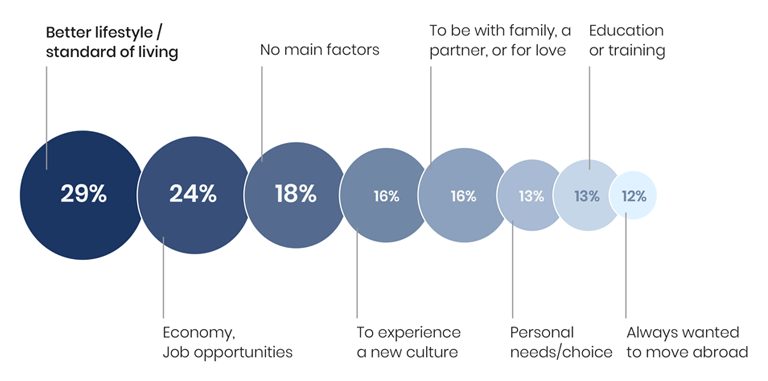
Q: What are the main factors that might/did motivate you to move abroad, when you are able to move? [Multiple responses allowed]
Fig 4 - Reasons why people have relocated internationally
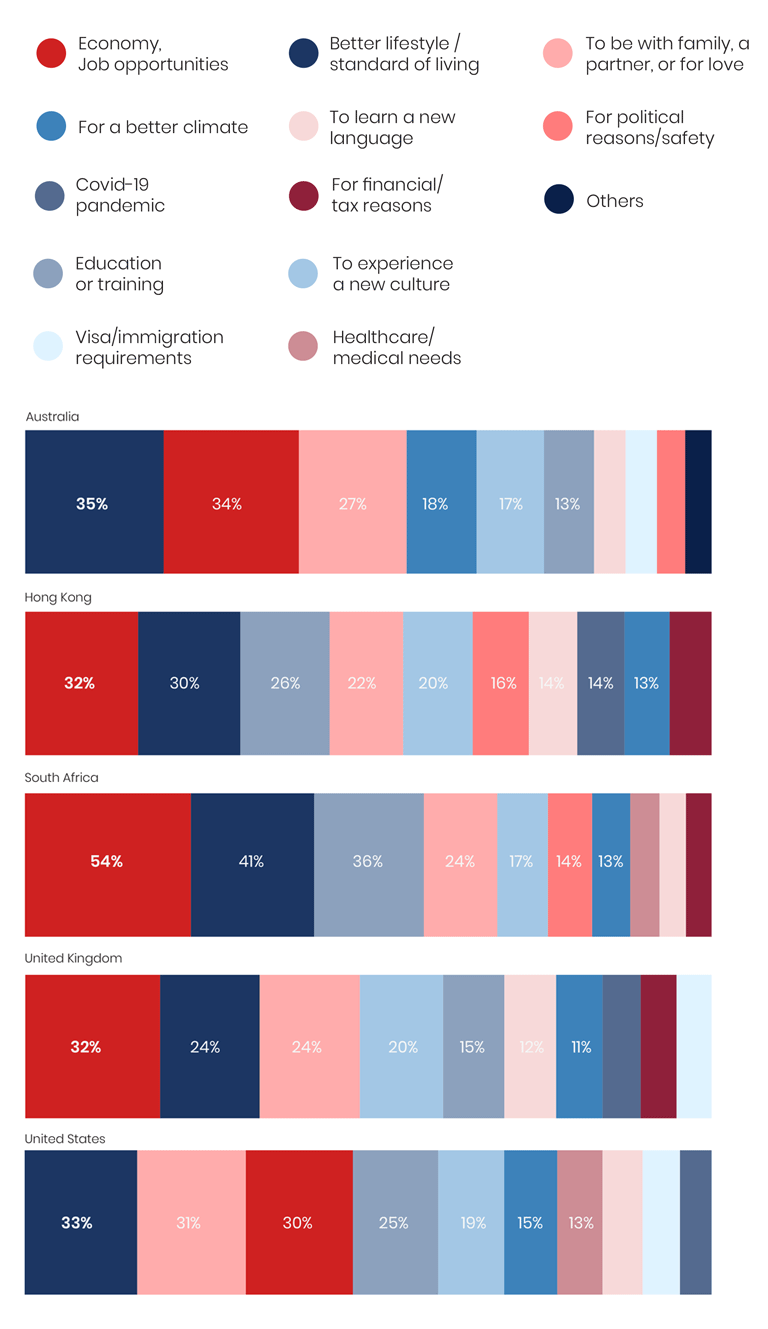
Q: Thinking about your most recent move, what was your reason(s) for relocating internationally? [Multiple responses allowed]
Top destinations for relocation
Our survey also looked into which countries people were intending to move to, and the reasons behind why they are moving; asking which countries are more favourable destinations than others. Globally, the top 5 countries for relocating internationally were the United Kingdom, the United States, Australia, Japan and Spain.
The ability to pursue opportunities abroad has been severely hampered by recent economic and mobility factors.
For some, this has led to a reluctance to follow through with their plans, or a lower likelihood to make new plans, given fluctuating travel restrictions plus related difficulties and uncertainty.
At the same time, a larger number of respondents have moved within the last 12 months (18.8%) and the year before (21.4%) when compared with 2-3 years ago (13.9%) and 4-5 years ago (13.8%).
Fig 5 - Top 5 countries for relocation

Q: When thinking about/planning for relocating internationally, which country would you plan to move to, if you had the chance?
Signs of the times – What we carry with us and why
Over the past 25 years, Seven Seas Worldwide has witnessed first-hand the many changes in where people go and what they choose to bring with them on their life journeys. Besides simply reflecting changing economic or technological realities, the things people choose to bring when they move across the world also have a lot to say about the times we live in, and the changing values of our global society.
For example, due to changes in technology in the past couple of decades, people are taking far fewer physical copies of books, movies and music - while placing a greater emphasis on personal items such as high-tech exercise equipment and high-end bicycles. Meanwhile, the reduced cost of televisions in recent times means they are more often seen as ‘disposable’.
People will only rarely ship heavy items such as furniture, which would typically be used as a way to express taste and a sense of home, preferring instead to bring smaller more personal items like clothes and handbags.
The effects of the Covid-19 pandemic on global mobility
As part of our deep dive into the role of the pandemic in the decision process, we asked respondents whether it had made them more or less likely to consider relocating internationally. Key takeaways include:
- Nearly half of respondents were not more or less likely to consider relocation during Covid-19 (42.8%)
- The figures seem to reflect a heightened sense of complacency, rather than a strong desire to move or stay
- Some markets (South Africa and Hong Kong) showed an increased desire to move as a result of the pandemic, while others such as Australia hampered such plans given movement restrictions
Fig 6 - How Covid-19 has affected moving plans
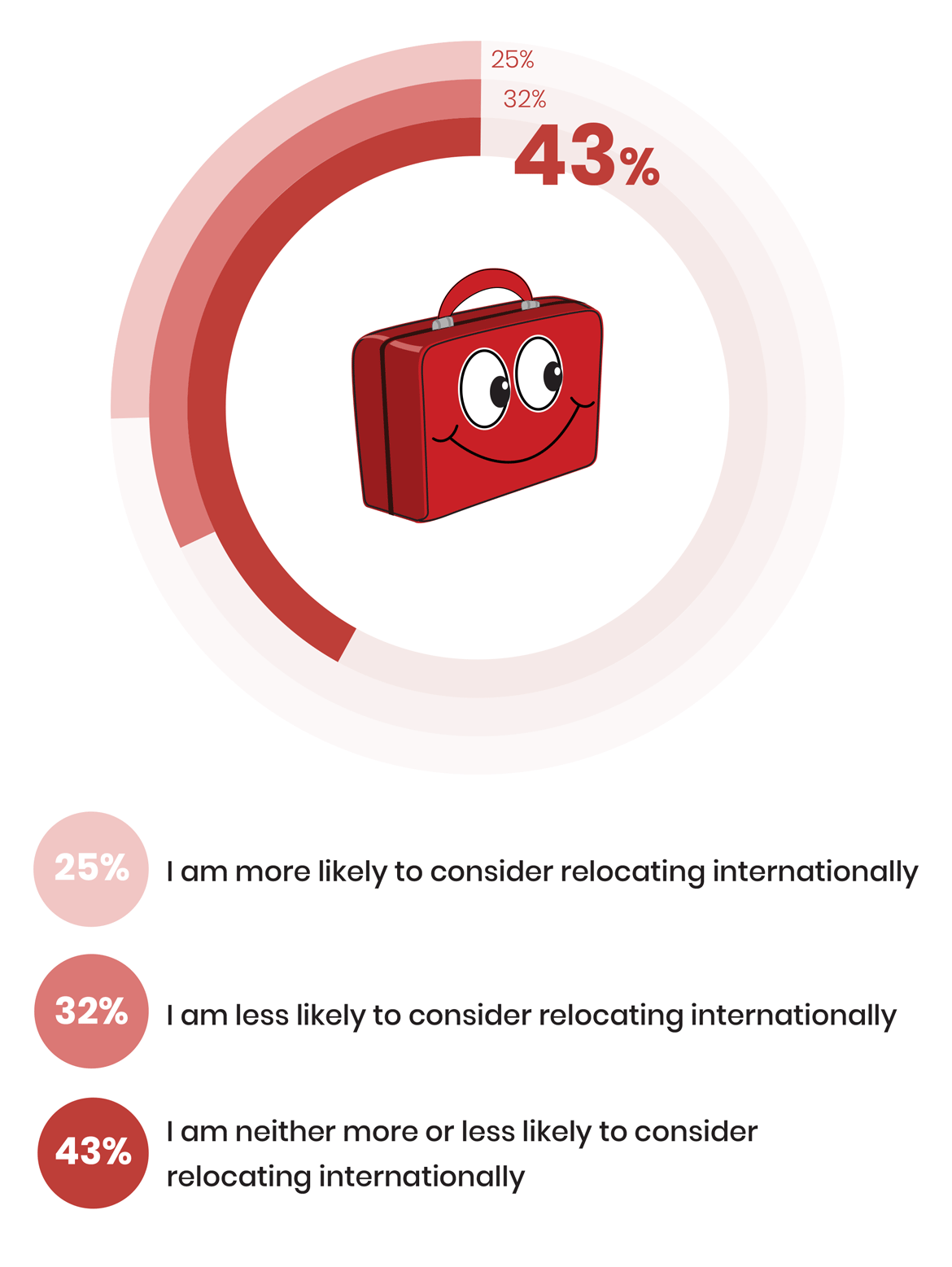
Q: Has the Covid-19 pandemic impacted your motivation to think about/plan for relocating internationally after travel and movement resumes?
When asking if the pandemic had caused people to adjust, postpone, or cancel their plans, it was revealed that Covid-19 restrictions and related concerns were the top reason for changing plans. Our data shows the pandemic has made strong impacts on global mobility, both in terms of logistical challenges, as well as psychological and emotional considerations. Some key figures included:
37%
who went ahead with their plans, or indicated that they plan to do so, gave lifting of Covid-19-related restrictions or eased concern as a reason for doing so.
46%
who cancelled their planned moves gave Covid-19-related restrictions or concerns as a reason for doing so.
However, as the situation improved and restrictions were lifted, we questioned what this would mean for global mobility - particularly among markets showing a pent-up desire to move.
Fig 7 - Reasons why people went ahead with a planned move
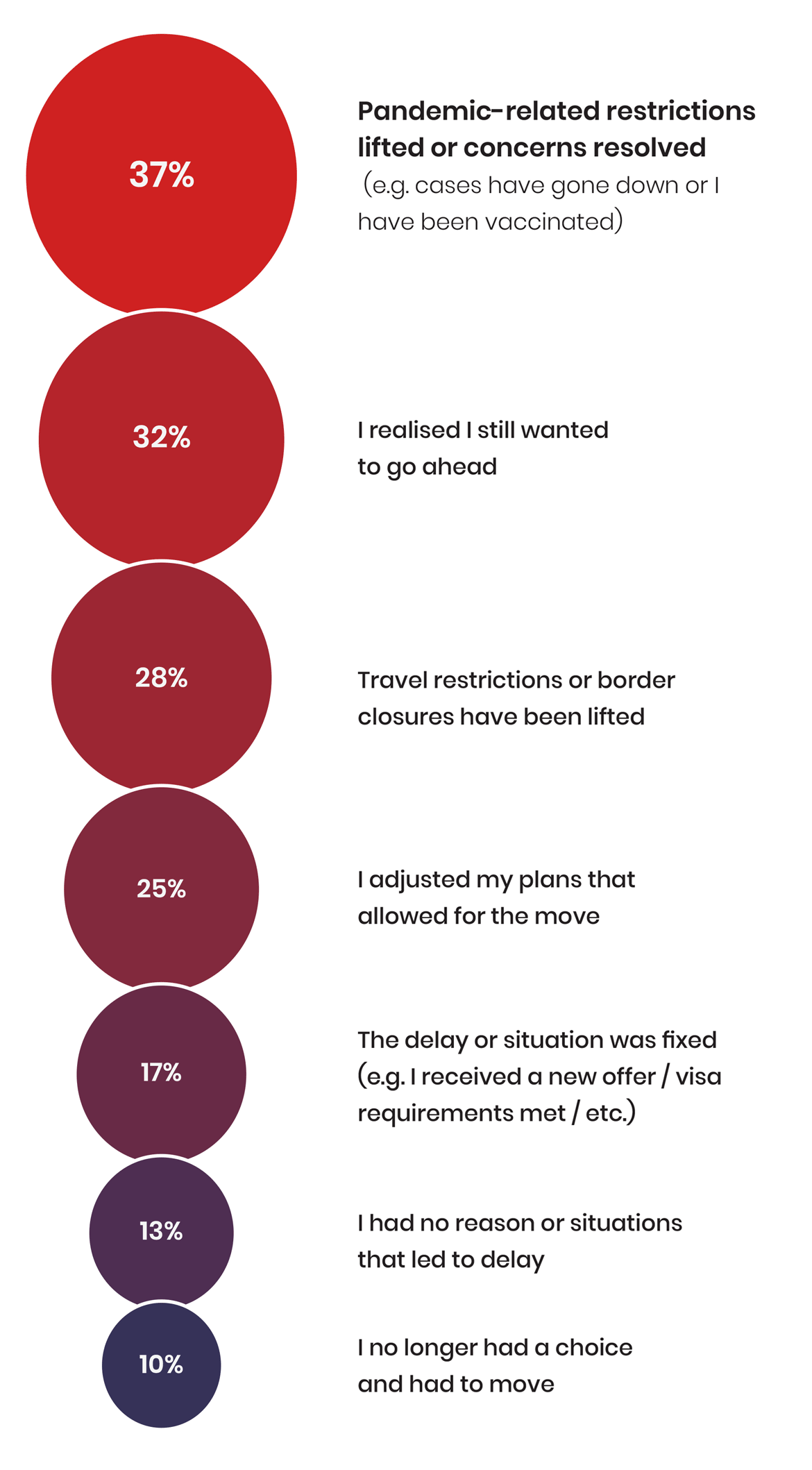
Q: If you went ahead or still plan to go ahead with the move, why was this? [Multiple responses allowed]
The next 'big move'
Predictions based on our data
Given the global trends revealed by our survey, combined with internal data from Seven Seas Worldwide, we estimate that the pent-up demand for global mobility will result in an increase in relocations for 2022 - with an uptick likely to begin in February or later. However, this is contingent on a few key factors which are yet to be determined:

Shipping Industry


Covid-19 Pandemic


Regional overview
Australia
Reasons for moving to and from Australia
Respondents living in Australia are no strangers to international relocations with 45.5% of respondents having done so previously, a figure higher than the average across all regions surveyed (39.7%). Only those living in Hong Kong had relocated more (52.6%). Those living in Australia were more likely to have relocated away from their home country than any of the other regions. While 44.9% of respondents in Australia who have relocated internationally said their most recent international move was away from home, the average across regions was only 39.4%. Those in Australia who have relocated internationally were less likely to have returned to their home country, with 35.0% stating this as the reason for their most recent move.
Those living in Australia have tended to put down roots following their most recent moves. For those in Australia who have relocated before, over half (53.8%) said this was more than five years ago – the highest among the countries surveyed.
Only 1 in 11 (9.0%) of those in Australia that have relocated have done so in the last 12 months – less than half of the global average of around 18.8%, possibly reflecting the implications of tight border controls that have been in place since March 2020. While there has been international movement in other regions, the majority of respondents have resided in their current relocation for longer than 12 months.
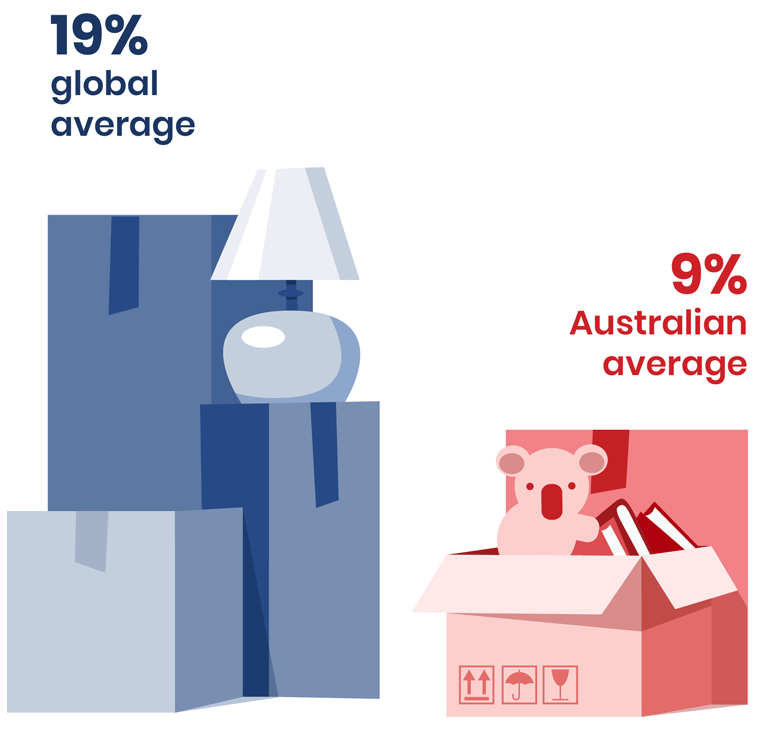
Fig 8 - Australians who have moved in the past year
Factors and consideration which motivate a move from Australia
The pandemic appears to have put a dampener on the plans of those in Australia to relocate internationally. More than half (52.5%) of respondents said they were less likely to consider moving after travel resumes, while only 12.9% were more likely to consider an international relocation. The remaining 34.6% were neither more or less likely to seek a sea change post-pandemic. This is in stark contrast to the other regions, particularly South Africa and Hong Kong in which respondents indicated an increased desire to move as a result of the pandemic. The survey found that 39.3% of respondents in South Africa were more likely to consider relocating, along with 35.0% of those in Hong Kong.
When thinking about an international relocation, movers from Australia had their sights set on English-speaking countries including the United Kingdom, New Zealand and the United States. The United Kingdom topped the list of desired countries having been selected by one fifth (20.0%) of respondents who planned to move, followed closely by New Zealand and the United States, each on 15%.
The ‘Aussie way of life’ still beckons for many
Australia remains a top choice for relocation –
47%
cited a ‘better lifestyle’ as the primary reason.
For those who have already relocated to Australia, over half said this was more than five years ago – the highest among countries surveyed. When it comes to considering outbound moves, over half of respondents in Australia were less likely to consider moving after travel resumes, while only 13% were more likely to consider an international relocation – suggesting that those who end up in Australia are content to stay put.
Covid-19 impact on mobility and moving plans
Relocations are largely off the cards for expats as Covid-19 continues to impact international travel. For those currently living in Australia, moving back home has not been a consideration, with 77.0% staying put. Among the regions surveyed, the intention to stay was highest in Australia. Across all respondents, 40.2% of those who have relocated internationally considered moving home during the pandemic, while 59.8% chose to stay in their country of residence.
Although 67.7% of those in Australia had no plans to move, it is unsurprising that Covid-19 related concerns caused moves to be adjusted, postponed or cancelled. Naturally, given the strict border closures, respondents in Australia who cancelled their international relocation plans were most likely to cite Covid-19-related restrictions or concerns (57.9%).
Although many respondents in Australia are not actively planning an international move, there is some demand for temporary relocations. One fifth (19.6%) of respondents in Australia would be open to a medium-term move of 1-2 years, compared to those in South Africa and Hong Kong who are planning longer-term moves, with 38.2% and 33.6% respectively stating it’s on the cards.
Expat analysis and insight
Work and study top the list of reasons why people have relocated to Australia during previous international moves. Education and training were the motivation for 38.1% of respondents. This was closely followed by economy, work and job opportunities in Australia for 33.3% of expats. The laidback Aussie lifestyle motivated 31.0% of survey respondents, as did the chance to experience a new culture.
Despite the challenges brought on by the Covid-19 pandemic, of those people in Australia who had plans to relocate prior, many have forged ahead or plan to do so when it is possible.
One fifth (20.3%) of respondents have already gone ahead with the move while a further 51.7% intend to do so. Only 28.0% have cancelled the move altogether, with 57.9% of those cancelling as a result of the pandemic.
Global demand to relocate to Australia was reasonably high, with respondents showing the most interest in a move to the United Kingdom (17%), followed by the United States (12%), with Japan (8%) rounding out the top three countries. The top reasons respondents considered or planned an international move were for a better lifestyle (29.3%), for economy or job opportunities (24.3%) and to experience a new culture (15.8%). The Aussie way of life is a huge drawcard for international movers. For those that chose Australia to relocate to, the top reason for moving would be for a better lifestyle (47%).
The Australia survey sample consisted of 1,004 people living in Australia who have a passport; 225 are considering or would like to move abroad, while 103 are expats.
China - Hong Kong
When asked the reason for their most recent move, 41.4% of Hong Kong respondents said they were moving to return to their home country, as compared with around 35.0% who said they were moving away from their home country, suggesting a higher number of returnees. Among these, the most common reasons for moving to the city were job opportunities (32.5%), followed by a better lifestyle (29.7%), and education opportunities (25.9%).
Hong Kong residents differ on reasons for past versus future possible moves
Among all respondents, the top reasons motivating a potential international relocation include better lifestyle or standard of living (32.1%), and job opportunities (23.5%).
The majority of all respondents from Hong Kong, upon considering possible relocation, would prefer a longer-term move at 3-5 years (33.6%), followed by a medium duration at between 1-2 years (21.5%); while only 18.7% would prefer a permanent relocation, and 18.6% are not considering a move at all. These numbers are similar to global averages, where 23.9% would prefer longer-term moves of 3-5 years, 18.4% would prefer medium-term moves of 1-2 years, and 16.2% would prefer a permanent move – only around 2.5% lower than Hong Kong.
Hong Kong holds a unique position in the region as a truly international city, which has long served as a gateway to China and the rest of Asia Pacific. Perhaps unsurprisingly, the data from Hong Kong respondents reflects a highly mobile cohort – with over half of all respondents having relocated internationally before (27.6% once, 25.0% more than once). Of these, over 21.9% have moved in the last 6 – 12 months.
The most popular destination country for relocation among Hong Kong respondents is the United Kingdom (21.7%), followed by Japan (15.6%), and Australia (14.2%).
Top reasons for selecting a location to relocate to include: for a better lifestyle (39.6%), experience new cultures (25.2%), and job opportunities (22.6%).
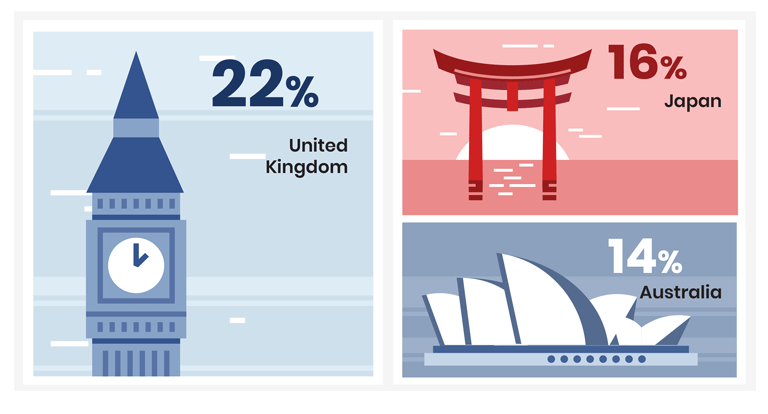
Fig 9 - Top relocation destinations for Hong Kong respondents
Q: When thinking about/planning for relocating internationally, which country would you plan to move to, if you had the chance?
Hong Kong respondents are among the world’s most mobile
In Hong Kong, over half of all respondents have already relocated internationally at least once before - while around 66% have plans or considerations to move internationally.
When respondents were asked the reason for their most recent move, 41.4% of respondents said they were moving to return to Hong Kong, as compared with around 35% who said they were moving away from their home – suggesting a high number of returnees.
Covid-19 impact on mobility and moving plans
As might be expected for a city that has faced multiple outbreaks over the years, Covid-19 has had a significant impact on whether or not people make or follow through with plans to move. In Hong Kong, 59.5% of respondents who have relocated internationally have considered moving back to their home country since the Covid-19 pandemic.
The majority of respondents had plans or considerations to move internationally (65.8% total) – of which 26.5% postponed plans, while 20.7% adjusted their moves.
Of respondents who postponed or adjusted plans to relocate, 59.6% still plan to go ahead, and 30.2% went ahead with the move. Most plan to go ahead or went ahead because Covid-19 restrictions were lifted (36.9%), they wanted to continue with the move (29.7%), travel restrictions or border closures were lifted (28.5%), and they adjusted their plans to allow for the move (28.1%).
Among those that cancelled the move, 43.1% also listed Covid-19-related reasons to be the cause of cancellation, followed by the timings weren’t right (31.0%). Respondents also cancelled the move as they were waiting to see what happens (27.6%), and due to travel restrictions (20.7%).
The Hong Kong survey sample consisted of 1,001 people living in Hong Kong who have a passport; 352 are considering or would like to move abroad, while 116 are expats.
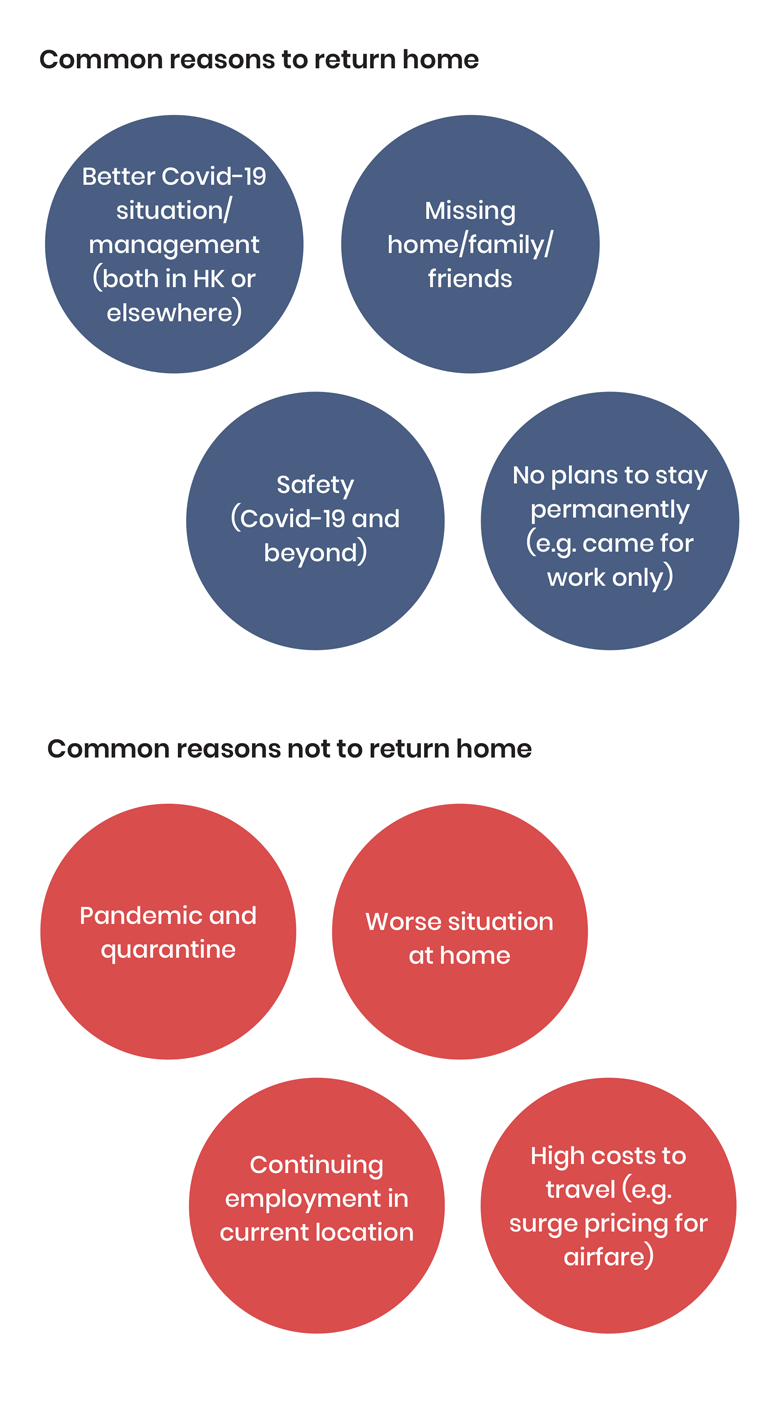
Q: If you currently live abroad (not in your home country), since the Covid-19 pandemic, have you considered moving back home?
Fig 10 - Reasons for or against returning home since Covid-19 among those living abroad
South Africa
Economy, work and job opportunities are the top reason for South Africans relocating internationally (54.1%), followed by a better lifestyle or standard of living (40.5%), education or training opportunities (35.7%), to be with family or a partner, for love (24.3%) and finally, to experience a new culture (16.5%).
These come before reasons such as for political reasons and personal safety (14.4%), for a better climate, (12.6%), healthcare or medical needs (9.6%), and for financial/tax reasons (8.4%). The pandemic has played a limited role as motivation in the migration of South Africans, as only 5.4% of people have relocated due to the pandemic.
Reasons for moving vary depending on duration of stay, number of moves
In comparison, for South Africans who have relocated internationally more than once, the top three reasons for their previous move were also for economy, work and job opportunities (45.7%), for a better lifestyle or standard of living (42.9%) and for education or training opportunities (37.1%).
While the top three reasons remain the same, experiencing a new culture has moved up the list; and to be with family, a partner, or for love has moved down the list. Interestingly, 20.0% of South Africans have relocated in the past to learn a new language, compared to only 8.7% in more recent moves.
Most who relocated did so more than 5 years ago (33.6%), while 16.8% relocated 2–3 years ago, 14.7% relocated 6–12 months ago, 13.8% relocated 4–5 years ago and 12.0% relocated 13–18 months ago.
The largest group of respondents who would relocate overseas are those staying for the long-term (3-5 years) at 38.2%, while 24.7% are permanent moves with no further relocations for the foreseeable future, 19.4% are medium-term (1-2 years) and 8.2% are short-term (less than a year).
When looking at expats’ most recent relocations, 41.7% were returning to their home country, 38.7% were moving away from their home country, and 19.5% were moving between non-home countries.
In terms of favoured destinations, respondents who were thinking about or planning to relocate internationally ranked their top three countries of consideration as the UK (24.3%), US (22.8%) and Australia (12.7%), while other notable countries include Germany (6.3%) and Italy (3.4%).
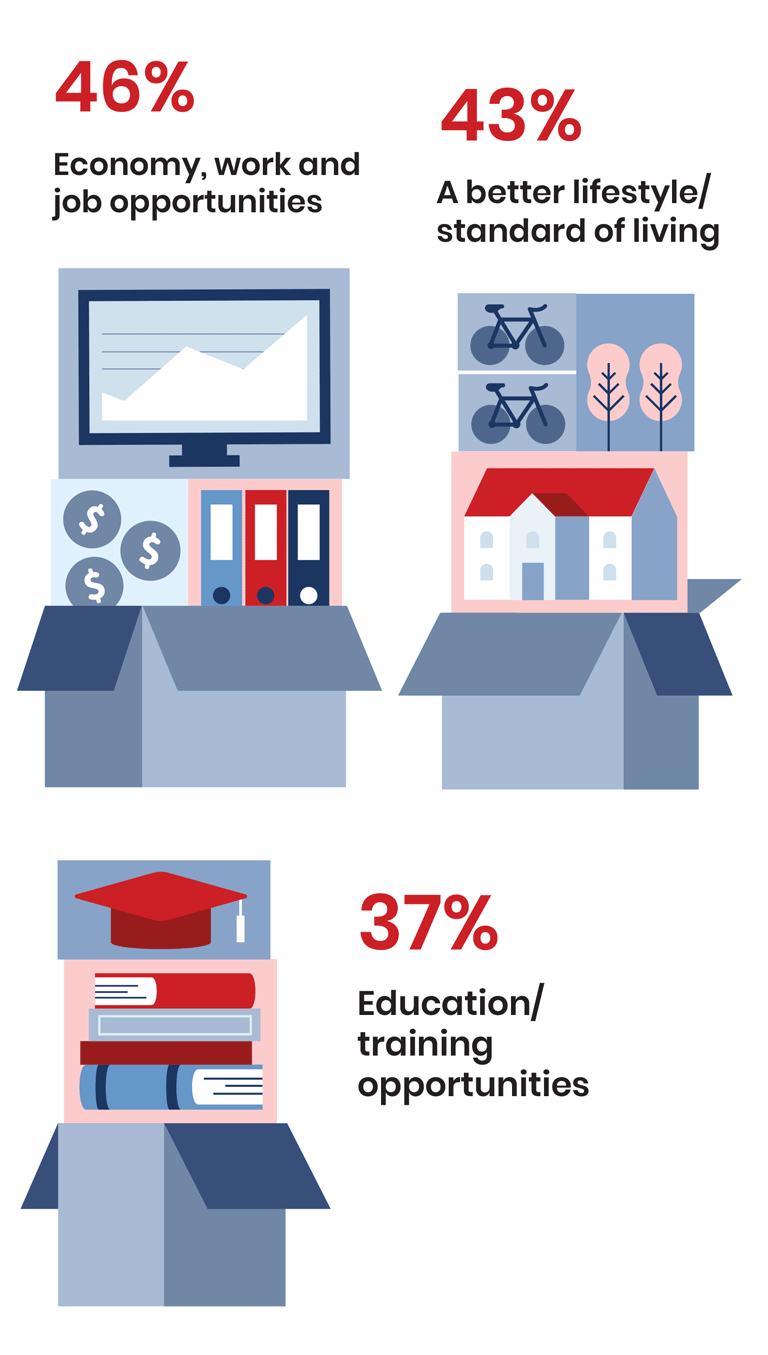
Fig 11 - Top reasons for South African respondents to move (those having relocated more than once)
Q: Thinking about your previous moves, what was your reason(s) for relocating internationally? [Multiple responses allowed]
South African movers on the quest for greater cultural experiences
Nearly one-fifth of South African respondents say their main reason for moving was to experience a new culture, and with nearly half in search for a better lifestyle.
For South Africans, the pandemic has not dented plans for relocating internationally - seeing as 39% are more likely to consider doing so after travel resumes.
Barriers to moving abroad
Having explored the motivations, it is important to identify the challenges when it comes to moving abroad. Unsurprisingly, Covid-19-related restrictions or concerns were cited as the top reason why respondents who were planning to relocate internationally cancelled their plans.
While 20.9% of South Africans have postponed plans to relocate internationally, 19.3% have adjusted their plans to relocate, while 9.5% have cancelled and 8.8% have relocated as planned. In total, 41.5% of South Africans surveyed do not have plans to relocate overseas.
For those that had their relocation plans adjusted or postponed but still went ahead or plan to go ahead, the top reason for this happening was due to Covid-19-related restrictions lifting or related concerns resolved (39.2%). This was closely followed by realising they still wanted to go ahead (38.9%), followed by travel restrictions or border closures lifting (34.1%), and adjusting plans to allow for the move (27.7%).
Meanwhile, for those cancelling the move, the top reason was because of Covid-19-related restrictions or concerns (50.0%) while the least cited reason was because they realised they weren’t comfortable with it (6.5%). This suggests that cancellations are more related to inability, rather than a decreasing desire to move.
Other reasons noted for cancelling international relocation are that the timings weren’t right (35.2%), travel restrictions or border closures were being enforced (25.0%), issues with cost of immigration or moving (23.2%) and circumstances no longer allowed for a move (20.4%). Another 13.9% encountered a delay or situation that could not be resolved, while 12.0% changed their minds.
Covid-19 impact on mobility
and moving plans
Covid-19 has not reduced the willingness of respondents to consider relocating internationally, as 83.7% of those with plans or considerations to relocate when travel resumes have either relocated as planned, or still intend to do so.
For those cancelling their international relocation, the top reason was because of Covid-19-related restrictions or concerns (50.0%). However, for South Africans, the pandemic has not dented their motivation to think about or plan for relocating internationally after travel and movement resumes - seeing as 39.3% are more likely to consider relocating internationally.
At the same time, 39.4% are neither more or less likely to consider relocating internationally, while 21.3% are less likely to consider relocating internationally due to the pandemic.
Interestingly, 60.7% of respondents currently living abroad have not considered moving back home since the start of the pandemic, while 39.3% have considered it.
The South African survey sample consisted of 1,008 South Africans who have a passport; 289 are considering or would like to move abroad, while 103 are expats.
United Kingdom
Factors and considerations for UK-based movers
When it came to reasons for having already relocated, respondents from the UK were most likely to have done so for a job or due to other economic prospects (32.1%). One fifth (19.8%) did so to broaden their horizons and experience a new culture, while nearly a quarter (23.9%) relocated in search of a better lifestyle or quality of living. Respondents also proved that absence doesn’t necessarily make the heart grow fonder and made a move for love: relocating in order to be with their family or a partner (23.9%).
Among those who haven’t yet relocated but are planning to do so, education and upskilling was key. One fifth of Brits want to make the move in order to undertake an internship, study or to take a second degree (14.7%), while 12.3% would like to do so in order to broaden their horizons and learn a new language.
Factors affecting a move away from the UK
Around the same number of UK respondents are choosing to relocate to the UK as are planning to relocate to another country - around 40% said their most recent relocation had been to leave home for the UK, while 38.2% said they had made the decision to return home.
Once Brits have made a decision to move abroad, it seems that they’re keen to then stay put. Of the UK respondents who were looking to relocate, a higher number said that the move would be permanent (13.7%), versus those who said their relocation would last under a year, between 1–2 years or between 3–5 years (5.4%, 11.1% and 12.1% respectively).
Our survey also found that respondents looking to relocate are doing so in search of some sun. Indeed, the most popular reason from Brits planning to relocate to a different country was that they were in search of a better climate (30.9%). The most popular place for Brits looking to move abroad, unsurprisingly, was Spain (17.6%).
Brits seek out sunny destinations – while arrivals come for jobs, quality of life
The UK was the most popular global destination for relocation, or for those planning to relocate internationally (17%). This went as high as 20% for Australians, 22% for Hong Kongers and 24% for respondents from South Africa.
When it comes to leaving the UK, the research showed UK respondents are either seeking the sun or other English-speaking locations. However, the pandemic has made Brits slightly wary of a move – with one fifth (21.8%) cancelling previous plans to relocate in the future.
UK respondents were most likely to seek out fellow English-speaking countries; with the US (12.8%) as second preference, and Australia (11.2%) as the third choice.
Covid-19 impacts on mobility and moving plans
Our research shows the pandemic has left respondents in the UK slightly apprehensive of relocating in the future: nearly one third (30.3%) say they’re less likely to consider moving abroad when international travel resumes than they were before the pandemic. Over one fifth (21.8%) went as far as to completely cancel plans to move abroad in light of Covid-19, after their original plans were adjusted or postponed.
For those respondents in the UK who may have moved here from abroad, over one third (35.5%) said they had considered moving home in the past year since the pandemic.
Reasons for moving to the UK from elsewhere
The UK was the most popular global destination for relocation, or for those planning to relocate internationally (17%). It’s an especially popular choice for Australians (20%), Hong Kongers (22%) and South Africans (24%) looking to relocate.
The UK survey sample consisted of 1,006 UK consumers who have a passport; 227 are considering or would like to move abroad, while 101 are expats.
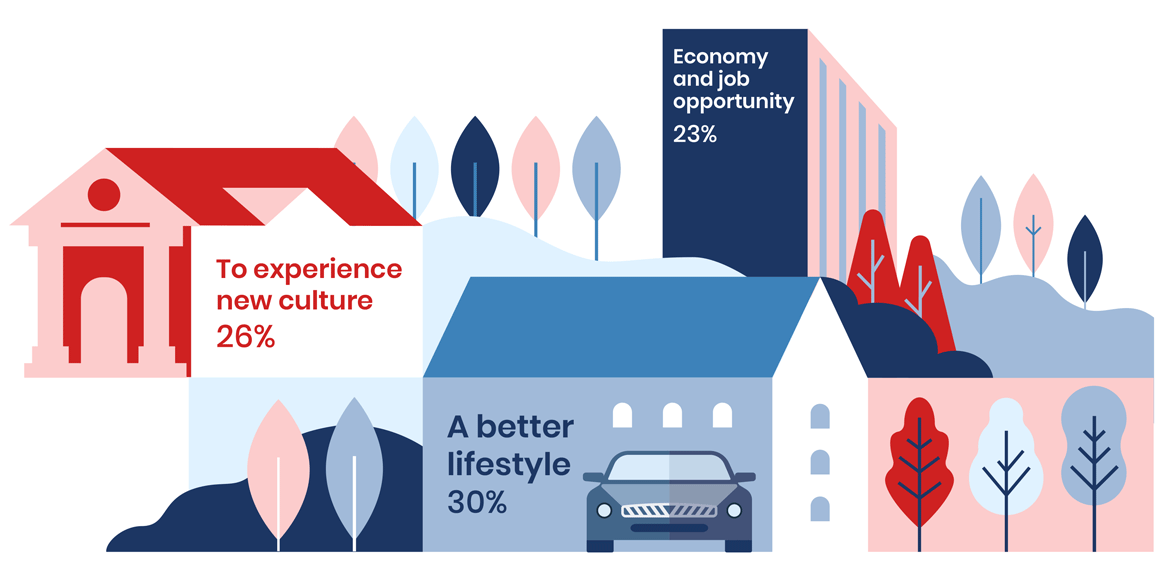
Fig 12 - Top reasons for moving to the UK
United States - New York and California
Reasons for moving among California and New York State respondents
Relocating internationally isn’t a frequent action taken by Californians or New Yorkers according to the survey - with only 17.4% of Californians and 17.6% of New Yorkers having relocated internationally more than once. However, among those who have relocated, both Californians and New Yorkers report relocating in the past six to 18 months (35.6% and 38.1% respectively). For Californians and New Yorkers who have relocated internationally, a slight majority moved away from their home country (39.9% and 38.6% respectively), compared to returning to their home country (34.0% and 36.6% ).
Additionally, among Californians and New Yorkers, most respondents report that they have not considered moving back to their home country since the pandemic (62.2% and 60.4% ).
When it comes to reasons why respondents in California and New York relocated abroad, the top three motivations were the economy, work and job opportunities (30.3% and 31.5% respectively), a better lifestyle or standard of living (27.1% and 37.6%), and to be with family, a partner or for love (35.6% and 27.4%). The least likely motivations for Californians and New Yorkers to relocate were the pandemic (7.5% and 10.2% ), for financial or tax reasons (8.0% and 9.1%), and for retirement (4.3% and 3.6%).
Californians and New Yorkers are more likely to stay put
Only 22% of California and New York residents report being likely to consider relocating internationally, while 50% reported that they are neither more nor less likely to consider relocating internationally. Meanwhile, only 17% of Californians and 18% of New Yorkers have relocated internationally – indicating lower levels of mobility compared to other markets.
For all Californians and New Yorkers, regardless of whether they have relocated in the past or not, the top considerations of destinations for relocating and/or considering relocating included looking for a better lifestyle (30.6% and 31.8%), wanting to experience a new culture (37.0% and 34.5%), and thinking that having a change of scenery could be beneficial (22.6% and 20.5%).
Factors motivating a move away from California or New York State
Overall, California and New York residents aren’t motivated to move abroad right now. Only 22.1% of California and New York residents report that they are more likely to consider relocating internationally, while 50.1% reported that they are neither more nor less likely to consider relocating internationally – as compared with South Africa (39.3%) and Hong Kong (35.0%) respondents, who are the most likely audience to have higher consideration to relocate internationally.
For those considering the potential of relocating abroad, the top country choices for Californians were the UK (18.0%), Japan (10.8%), Mexico (9.2%) and Italy (9.0%). While the UK also holds the top spot among New Yorkers, their top country choices for relocation are slightly different compared to Californians: the UK (22.1%), Italy (13.4%), Australia (8.3%), and Japan (6.9%).
The US survey sample consisted of 1,007 people living in California and New York who have a passport; 230 are considering or would like to move abroad, while 100 are expats.
Fig 13 - Reasons for Californians and New Yorkers to move abroad
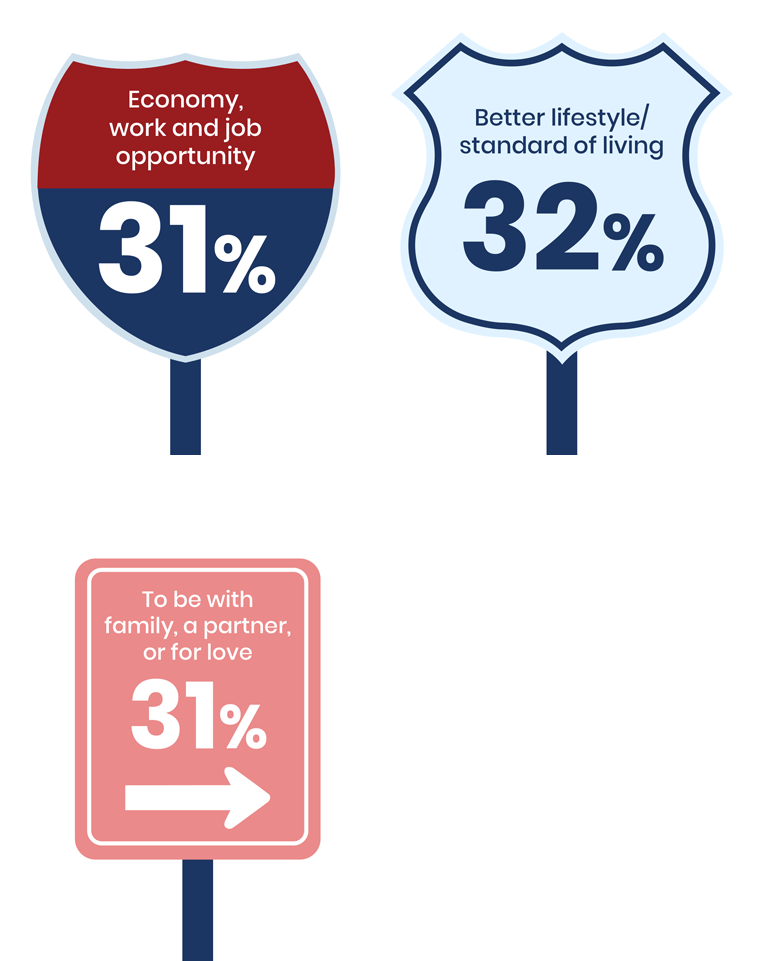
Q: Thinking about your most recent move, what was your reason(s) for relocating internationally [Multiple responses allowed]
Key takeaways
and conclusions
Key Takeaways
Mobility and intention of movement varies across markets
- Hong Kong is the most mobile market with 53% of respondents reporting having relocated internationally before
- UK is the lowest with 29.1%
- Notably, among those who have relocated, 25.5% of respondents from California and New York did so within the last 12 months – showing that respondents have continued to relocate despite potential pandemic-related challenges
Key considerations for moving remain the same, but Covid-19 has undoubtedly amplified some considerations
- Job opportunities and work remain the top reason for international moves made in the past 18 months or earlier (31% and 36% respectively)
- When contemplating future moves, better lifestyles becomes the leading motivation at 29.3%
Covid-19 has hampered desire for travel among some respondents, but others are undeterred
- The Covid-19 pandemic has caused widespread barriers to travel in the past 18 or so months, with countries such as Australia facing severe lockdowns on travel
- This has led to significantly decreased consideration for relocation, even after travel resumes, among countries such as Australia (52.5%), UK (30.3%), and the US (27.8%)
- However, some markets remain undeterred and keen, with 39.3% of South African and 35.0% of Hong Kong respondents saying they are more likely to consider moving when able
Relocation plans driven by wide range of motivations
- 29.3% said that better lifestyles were a consideration but 17.9% also said that there aren’t main factors that may motivate them to move abroad
- This may reflect a sense of restlessness or curiosity to travel, and that people are creating their own opportunities
UK was the top relocation destination globally
- 17% of global respondents would move to the UK if they had the chance, with the top reason being for a better lifestyle (35%)
- The UK was the top destination for Australians (20%), South Africans (24%), Hong Kongers (22%), and Californians & New Yorkers (20%)
Conclusion
In our increasingly connected global society, today’s would-be movers come from a diversity of cultural and geographical backgrounds, and must consider a variety of social, personal and economic factors. As our report shows, a significant number of people are moving between non-home locations or relocating more than once; which likely means more families are spread across the globe. The way people define ‘home’ is evolving as a result – it may be where the heart is, but isn’t always an obvious choice.
While career opportunities remain a key driver for international relocation, we are seeing shifting priorities brought forward by the pandemic. Remote work is becoming more common, which means the landscape of relocations and mobility is likely to change even further. This could make shorter postings abroad more likely in the future, while company-sponsored or self-initiated relocations could serve as a stepping stone for individuals or families seeking to start a new life abroad.
As the intertwined relationship between work and travel continues to tighten, we also expect to see a new group of “digital nomads” seizing the opportunity to work more independently – while previously such arrangements were largely associated with freelancers or solo entrepreneurs, the pandemic has demonstrated that physical offices are not a prerequisite for productivity among the workforce as a whole. This gives companies a chance to save costs on office space, while allowing employees the opportunity to choose the lifestyle they want; whether it means a home office on a farm in Australia, a remote village in Japan, or working from a beach in Spain.
Whether relocating for professional or personal reasons, or a combination of both, our customers have a lot to keep in mind as they consider a world of new possibilities. Wherever their path leads them, Seven Seas Worldwide will be on hand and ready to support their next move from here to there.
About Seven Seas Worldwide
Seven Seas Worldwide are world leaders in both nationwide and global moves, helping thousands of customers each year move or store their personal belongings, excess baggage and household items.
We understand how stressful moving home can be - so we’ve worked hard to ensure our shipping process is uncomplicated, affordable and supportive. We offer peace of mind, as a proud member of FIATA, the International Federation of Freight Forwarders Associations, and BIFA, the trade association for UK companies moving freight internationally.
Whether you need help moving a few boxes, or the contents of an entire house, Seven Seas Worldwide will be there to collect, store and deliver your personal belongings whenever and wherever you need them.
Seven Seas Worldwide was established in the 1990s by brothers John and Will Henderson, who continue to head up the business from their United Kingdom base in Kent. Their success has helped them over the years to open a series of depots and offices worldwide.
Customer Support:
Press and Media Contact
Australia
Local or national call: 1 300 21 66 98
Canada
Local or national call: 1 833 698 7363
China Mainland
Call centre: +86 400 181 6698
Europe
Call centre: +44 333 733 7337
Hong Kong
Call centre: +852 2724 6698
Malaysia
Local or national call: 1800 88 6698
New Zealand
Local or national call: 0508 21 6698
Singapore
Local or national call: 8001 86 6698
South Africa
Local or national call: 0800 21 66 98
Thailand
Local or national call: 1800 010 158
United Kingdom & Republic of Ireland
UK Local or national call:
0333 733 7337
United States
Local or national call: 877 817 7327








